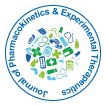Unsere Gruppe organisiert über 3000 globale Konferenzreihen Jährliche Veranstaltungen in den USA, Europa und anderen Ländern. Asien mit Unterstützung von 1000 weiteren wissenschaftlichen Gesellschaften und veröffentlicht über 700 Open Access Zeitschriften, die über 50.000 bedeutende Persönlichkeiten und renommierte Wissenschaftler als Redaktionsmitglieder enthalten.
Open-Access-Zeitschriften gewinnen mehr Leser und Zitierungen
700 Zeitschriften und 15.000.000 Leser Jede Zeitschrift erhält mehr als 25.000 Leser
Indiziert in
- RefSeek
- Hamdard-Universität
- EBSCO AZ
- Publons
- ICMJE
Nützliche Links
Open-Access-Zeitschriften
Teile diese Seite
Abstrakt
Quantification of Antiplatelet Effects through Ex Vivo Platelet Aggregation Assays
Linsheng Zang
The quantification of antiplatelet effects utilizing ex vivo platelet aggregation assays. Platelet aggregation plays a crucial role in hemostasis and thrombosis, making it a key target for assessing the efficacy of antiplatelet therapies. Various agents have been developed to modulate platelet function and reduce the risk of thrombotic events. To accurately evaluate their effects, ex vivo assays offer a controlled environment that mimics physiological conditions. In this investigation, a comprehensive review of the principles behind ex vivo platelet aggregation assays is provided, outlining their relevance in assessing the pharmacological activity of antiplatelet agents. The methodologies involved in preparing platelet-rich plasma and conducting aggregation assays are discussed in detail. Furthermore, the study examines the factors influencing assay results, including platelet concentration, agonist selection, and assay conditions. Through a series of experiments utilizing established antiplatelet agents, the utility of ex vivo platelet aggregation assays is demonstrated. The results underscore the sensitivity of these assays in detecting differences in platelet aggregation patterns, thus highlighting their potential for guiding therapeutic decisions. The study also addresses the limitations of these assays, such as their reliance on blood samples and potential variability. In conclusion, this paper sheds light on the significance of ex vivo platelet aggregation assays as a valuable tool for quantifying the antiplatelet effects of various therapeutic agents. By enhancing our understanding of platelet function modulation, these assays contribute to the advancement of personalized medicine in the realm of cardiovascular health and thrombosis prevention.
Zeitschriften nach Themen
- Allgemeine Wissenschaft
- Biochemie
- Chemie
- Genetik und Molekularbiologie
- Geologie und Geowissenschaften
- Immunologie und Mikrobiologie
- Klinische Wissenschaften
- Krankenpflege und Gesundheitsfürsorge
- Landwirtschaft und Aquakultur
- Lebensmittel & Ernährung
- Maschinenbau
- Materialwissenschaften
- Medizinische Wissenschaften
- Pharmazeutische Wissenschaften
- Physik
- Sozial- und Politikwissenschaften
- Umweltwissenschaften
- Veterinärwissenschaften
Klinische und medizinische Fachzeitschriften
- Anästhesiologie
- Augenheilkunde
- Betrieb
- Dermatologie
- Diabetes und Endokrinologie
- Gastroenterologie
- Genetik
- Gesundheitspflege
- Immunologie
- Infektionskrankheiten
- Kardiologie
- Klinische Forschung
- Medizin
- Mikrobiologie
- Molekularbiologie
- Neurologie
- Onkologie
- Pädiatrie
- Pathologie
- Pflege
- Toxikologie
- Zahnheilkunde

 English
English  Spanish
Spanish  Chinese
Chinese  Russian
Russian  French
French  Japanese
Japanese  Portuguese
Portuguese  Hindi
Hindi